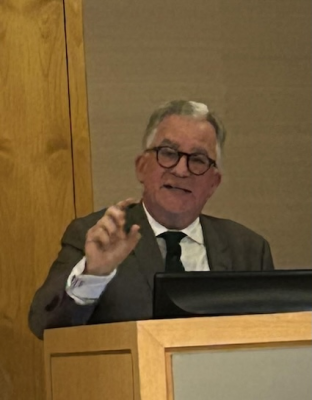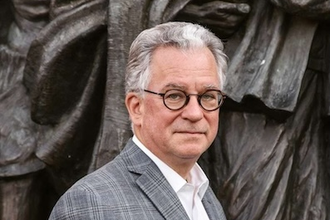Austen Ivereigh gives 185th Tablet Anniversary Lecture

Image: ICN/JS
Papal biographer and journalist Dr Austen Ivereigh, was keynote speaker at The Tablet's 185th anniversary celebration in London on Tuesday evening. BBC broadcaster and presenter Ed Stourton joined for a discussion and Q&A after the lecture.
Dr Philip Crispin writes:
Austen Ivereigh, a good friend and celebrated biographer of the late Pope, delivered The Tablet's 185th Anniversary Lecture: From Francis to Leo: Reshaping the Church for a Change of Era on Tuesday evening. The lecture took place in the City of London and was hosted by CCLA Investment Management.
Dr Ivereigh identified Pope Francis's championing of 'God's style' - 'What the human heart yearns to find in the Church' and made clear that 'God's style' is of crucial, Incarnation-based, substance. It is "close and concrete, tender and merciful' and markedly different from 'the impersonal, transactional logic of the market. Francis asks the Church to reflect God's way of being with us."
In his lecture, Dr Ivereigh identified the seeds of Francis's transformative pontificate in the Latin American reception of Vatican II and particularly in a 'landmark meeting' - the Fifth Latin American Episcopal Conference held in May 2007 in Aparecida, Brazil.
At Aparecida, the then Cardinal Bergoglio was elected by his fellow bishops to chair the committee charged with drafting the final document.
The conference came after 'an unprecedented three years of a discernment process which had asked honest, hard questions of the faithful'.
When Cardinal Bergoglio celebrated Mass in the Sanctuary of Our Lady of Aparecida during the conference, he noted in his sermon that the institutional Church was like the bent-over woman facing down to the ground in Luke's Gospel while the people were way over yonder. The people applauded at the end of his homily. He had struck a resounding chord.
It was at Aparecida that Bergoglio discerned the signs of the times, in the tradition of Vatican II, which would shape the direction of his pontificate. 'The Spirit was calling the Church to change in order to evangelise in this change of era.'
Dr Ivereigh said: "The bishops were convinced that Cardinal Bergoglio was 'anointed' and continued by describing the Aparecida final document as a 'ragbag but a surprise of the Spirit: a kind of Pentecost for the Church."
It was from Aparecida that Francis understood the need for a missionary Church of the peripheries and that the Spirit was calling the Church to change in order to evangelise in this change of era. Aparecida provided the blueprints for Francis's important papal documents: Evangelii Gaudium about the new evangelization in 2013, Laudato Si on human ecology and caring for our earth in 2015, and 2016's Amoris Laetitia about the challenges facing the family.
Aparecida had grappled with the 'epochal change' discussed by the sociologist Alfred Weber which identified the tensions and anxieties provoked during a time of crisis and magnified by the digital and AI revolution. The fault-lines can be traced in globalisation, the waning of institutions, the collapse of grand narratives, secularism and the cult of the individual subject.
Whereas the institutional Church had failed in its discernment of this epochal change, Aparecida rejected panic and a blanket critique of secularism. Informed by his earlier discernment in the Latin American church, Francis recognised the chance of conversion implicit in every crisis and understood that the institutional Church needed to give up its attachment to a certain model of power, the better to communicate the Gospel in humility.
Dr Ivereigh paused at this juncture to compare Francis's mission with 'MAGA-style culture wars' which extended to liturgical nostalgia. The key was discernment. Once again inspired by the findings of Aparecida, Francis understood that in this era of swirling change, narrative overload and consumerism, Christianity could no longer simply be reduced to an inherited religio from family and institutions but rather faith would be handed on from person to person just as it was in the early Church - and here the experience of God's mercy would be transformative.
Pitted against this, argued Dr Ivereigh, was 'clericalism'. Francis used this word to describe a misplaced equating of the Church with the episcopacy and clergy which sidelined a passive laity. Rather, he said, quoting the "new Doctor of the Church, St John Henry Newman,' there was a need for 'an intelligent, well-instructed laity."
Francis saw the clerical Church as "remote, abstract, self-referential, and full of a loveless moralism." On the contrary, it needed to transmit the amazing revolution of God's mercy and love. John O'Malley identified this as an issue of style in his book What Happened at Vatican II. Evangelisation would succeed not by juridical command and control and apologetics but through a loving, compassionate and humane hospitality.
Dr Ivereigh spoke movingly about how the late Pope made people he encountered feel "seen, recognised, loved and valued," and how in his first proper encounter with Francis he had felt "loved and free" as he imagined the disciples had felt in the presence of Jesus. Francis of course had always insisted that Christ was at the very centre of the Church's mission. Aparecida concludes: "Knowing Jesus Christ by faith is our joy, following Him is our grace and transmitting this treasure to others is a mission that the Lord, by choosing and calling us, has entrusted with us."
Deep and meaningful consultation with the laity had been crucial to the outcomes of Aparecida and this led directly to Francis's promulgation of synodality which was 'key to pastoral missionary conversion', noted Dr Ivereigh. This should be an ever-renewing process in which the whole people of God - the sensus fidei - listen and discern what God is saying through the signs of the times.
Dr Ivereigh noted a crucial continuity in the election of Robert Prevost to the Papacy. He was a US citizen but 'the second Latin-American Pope deeply formed by Aparecida.' Robert Prevost had been Bishop of Chiclayo in northern Peru from 2015 to 2023 and had become a Peruvian citizen. Pope Leo had pledged a renewal of the path of Vatican II and Dr Ivereigh stressed that the Pope had also insisted on proclaiming the primacy of Christ, the missionary conversion of the Church, and the ongoing synodality of the 'people of God'.
Whereas Popes John Paul II and Benedict had closed the papal dialogue with modernity, Francis and Leo had entered upon a dialogue with post-modernity, said Dr Ivereigh. He identified Leo as a 'bridge-builder not a visionary' but believed he had 'enormous ability to implement a vision' - the visionary transformations initiated by Francis. He also applauded Leo's continuation of Francis's striving after peace and condemnation of war.
Dr Ivereigh spoke of the ideal of parishes being living communities of faith, participation, widely shared ministries and communion. He noted the alarming phenomenon of 'lapsation' in the Church in England and Wales where great swathes of the faithful were desisting from coming to Church, saying: 'We didn't think we would be missed.' This answer gestured towards precisely the aloof clerical Church Francis had sought to transform. Dr Ivereigh lamented, too, the lack of engagement with the synodal path - which should involve the whole people of God - by the English and Welsh bishops. 'The people are not being told about synodality by the priests and bishops,' he said. Time and again, he heard the same questions: 'Where are the young?' 'What will happen to our parishes?'
"There is a huge gap," he said, "in the incredible discernment of the synod on synodality yet in so few being aware of this. People are aware that this is a change of era but not of any details. The bishops really need to manage decline so that there can be a new birth. We are the Easter People."
Whereas Francis had brilliantly recognised a change of era, they had had nothing to say and were only now changing their tune thanks to Leo's very enthusiastic endorsement of the three-year synodal journey now being undertaken. A discussion of synodality was now on the Bishops' Conference agenda, he said.
Noting feminist and other progressive concerns raised by the audience, Dr Ivereigh said he believed the Church would remain firm in the ongoing culture wars though he conceded there was a 'schism' between progressives and conservatives in the Church, itself.
In lighter remarks, Dr Ivereigh noted that after the necessary research, he had become convinced that Robert Prevost would be elected Pope and had said so in a CBS interview - only for the incredulous editors to cut this claim before broadcast. He also noted that Prevost's personal trainer - who had only known him as 'Roberto' - said Pope Leo was in excellent physical condition for a 69 year-old.
Brendan Walsh, Editor of the Tablet, thanked Austen for his lecture and spoke of the 'yearning for community' he discerned in the Tablet readership.
Fausta Valentine from Pax Christi commented: "The Tablet's 185th Anniversary Lecture: From Francis to Leo: Reshaping the Church for a Change of Era by Austen Ivereigh last evening was excellent in my opinion. The lecture had a good mix of facts, opinions, teachings one could relate to and when it was theoretical it sounded a bit top down.
"The icing on the cake was during Q&A when Ellen Teague very gently but firmly weaved into Synodality - asking how the grass roots work of groups like Pax Christi on nuclear issues and Gaza were acknowledged?"


















